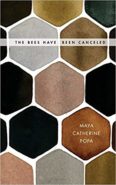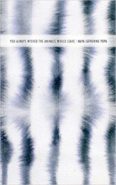
Review: Two Chapbooks by Maya Catherine Popa
Reviewed by Sarah Appleton

The Bees Have Been Canceled: Poems
Poems by Maya Catherine Popa
New Michigan Press, February 15, 2017
$9.00; 48 pp.
ISBN: 978-1934832592

You Always Wished the Animals Would Leave
Poems by Maya Catherine Popa
New Michigan Press, March 1, 2018
$9.00; 40 pp.
ISBN: 978-1934832653
At first blush, the title of Maya Catherine Popa’s chapbook The Bees Have Been Canceled and titular first poem seem playful. How can bees be canceled? That Popa is calling out the damage humans wreak on the environment and on each other becomes readily apparent. “I’m arranging information / available to anyone,” the speaker asserts in “Uranium in English,” after juxtaposing nuclear death and a store, The Alabama Shot , that stocks a “My First Rifle,” including a pretty pink rifle for a girl. From there, the poem accrues gravity as Popa points out how irreversible our actions can be. A brother shoots his sister with a cricket rifle, a miniature sold by a man to the father “with the knowledge // he’d outgrow it / like a pair of shoes.” Popa builds to this moment: the sickening weight of a system that inevitable leads to such accidents, to a death one must live with. In the end, it’s the uranium that “will glow into infinity / a Vaseline sheen” while humanity will perish.
How one can forgive—themselves or others—for atrocities is a central motif of the chapbook. The boy who kills his sister with the cricket rifle must learn how to live with what he has done. In “Wandmaker,” the speaker, watching the news about the Boston Marathon bombing, asks herself,
Are these my people, my misguided
people, and how should I keep on
loving them, forgiving them, who can
teach you that, really?
The speaker questions, too, the hunters who snipe off the beak of a hawk and leave it for dead. “I do not know / who these people are,” she muses in “Eagle,” “who snipe the sky & walk off / when they know they’ve missed the heart.” In other words, there is evil in the world. Understanding it and forgiving those who commit it cannot be readily resolved.
Popa continues trying to understand those who hurt others in her most recent chapbook You Always Wished the Animals Would Leave. “But when I try to imagine our president,” the narrator thinks in “American Faith,” “understanding imagination is the basis / of all faith, I suffocate on hatred’s loneliness.” In the end, Popa “want[s] a kind of betterness” in the face of all the hurt and trauma. “Want it desperately,” the speaker says. But it is not so simple, of course, so she must hold onto the words, “You are here now. You must believe in something.”
Perhaps most threatening of all is the mind, that thing which ultimately, if our thoughts are acted on, can have irreversible, horrible effects on the world around us. “[W]ho can say / if the mind is worse than what’s out there / circling the night,” the speaker wonders in “The Seer Dreams Antigone.” “We’re counted on to make a safety of our minds,” the speaker notes in “Yard Sale,” although it’s clear from Popa’s poems that this often does not happen.
Popa grounds political points in personal experience, layering almost-too-big facts with prosaic touchstones. “The panda cam is off: / people are distressed,” the speaker observes in “The Government Has Been Canceled”; without the live feed, people can’t confirm that the cub is being fed. Of course, a canceled government has greater implications because while the government may be canceled, people are not, “not the bodies furloughed / not the bodies waiting.”
Just as in The Bees Have Been Canceled, human impact on the world comes up as a motif in You Always Wished the Animals Would Leave. “I wasn’t afraid / of what the world might do to me,” the speaker of “Terribilità” thinks. She later wonders, “What is this world we are making // for each other? A slaughter that cannot / be rendered or mean.” The speaker notes in “Late Under October’s Supermoon” that “[i]t’s what we are that keeps a blight upon us.”
One of these blights we threaten ourselves with is gun control, another motif in both chapbooks. “I’m sorry there can’t be more poetry in this,” she apologizes in “On the Forces of Improvisation Under the Gun Law.” “[T]he right to buy what may kill a room full of people—this failure is freedom,” she states.
Popa’s descriptions are brilliant for the vividness they conjure, sparkling much in the same way as Anne Carson’s writing. “Never the yellow, hula hooped in black, little engine left running late into the darkness,” Popa writes in “The Bees Have Been Canceled,” describing bees, although Popa uses “bees” only once in the poem, a word that feels so flat compared to her rich descriptions. In “Meditation Having Felt and Forgotten,” the passing of time leaves the speaker with “a diamond of bitterness.” In “Meadowlarks and Markers,” a trigger has an “anthracitic smile.” These brilliant descriptions painfully yet beautifully relay the darkness in our world, darkness we are largely responsible for, and the repercussions we must live with. And despite this darkness, there’s no need for Popa to apologize because her poems are poetic, dark though the world may be.
Sarah Appleton has work published or forthcoming in Michigan Quarterly Review, the Rumpus, the Ploughshares Blog, the Los Angeles Review, and Grist. She earned an MFA from Western Washington University. She teaches at Cranbrook Kingswood School, where she lives with a hundred girls, her husband, and their beautiful Australian Shepherd, Zoë. You can find her on Twitter @sarahkapples.

Leave a Reply